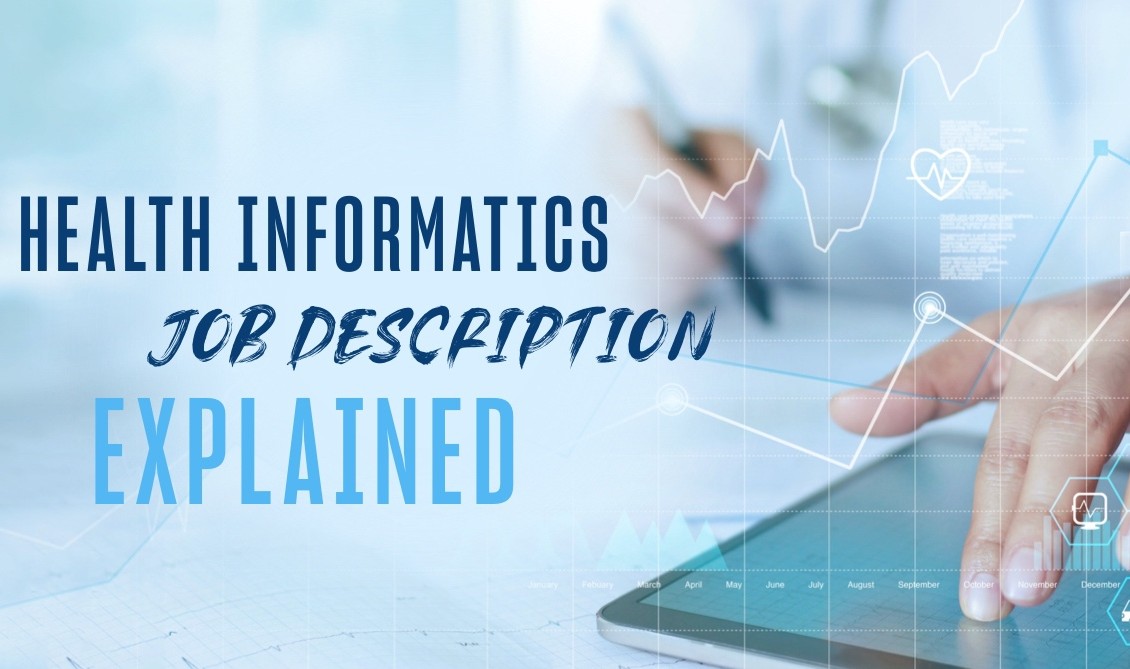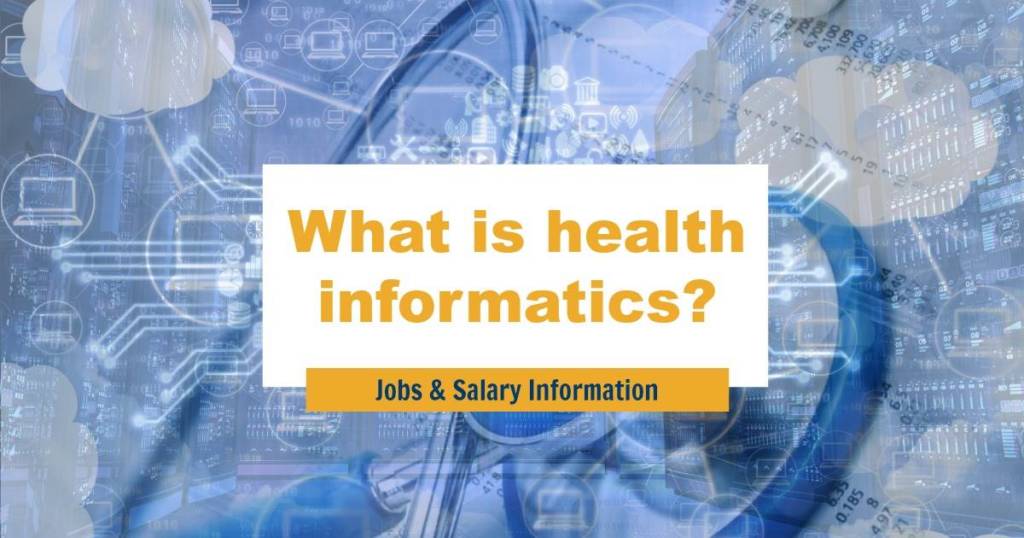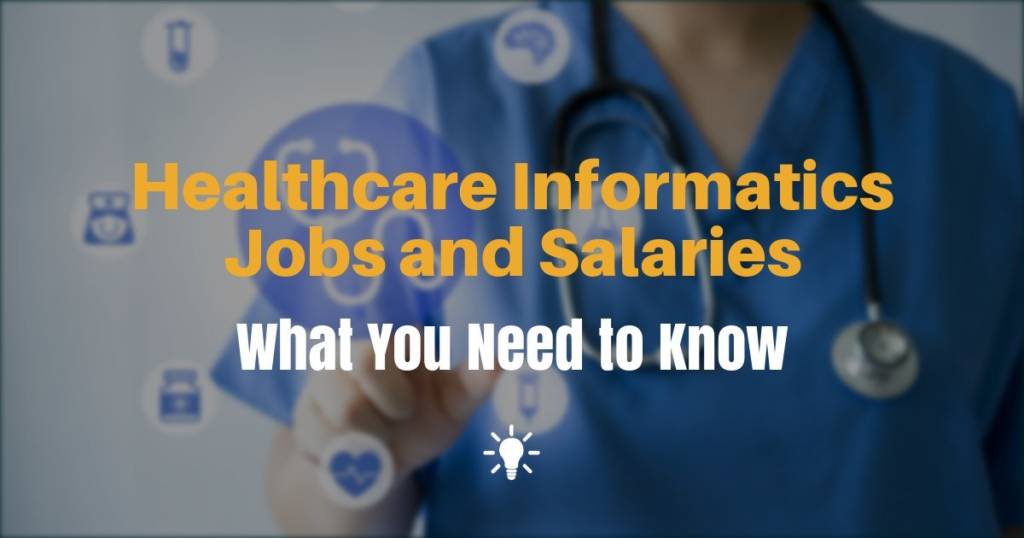It is undoubtedly a great time to consider a career in the health care field, even if you are not interested in a clinical role. In fact, people who have experience in things like data analytics, health information management and systems technology are a good fit for one of the most in-demand and growing career paths — health care informatics.
If you’re new to the field, some of the terminology may seem complex or confusing. To help, the following are typical job functions and requirements found in most health informatics job descriptions, explained in both the common language of the field and illustrated with the types of work you can expect to do as a health informatics professional.
Sample Health Informatics Job Description
Day-to Day Functions:
- Systems development: Design and implement tools that collect, manage, and analyze health data with the goal of improving patient care and day-to-day processes.
- Problem solving: Work with other departments within the health care setting to optimize efficiencies, reduce expenses, and improve operations.
- Data analytics: Lead data analysis efforts to help inform decisions and actions by health care leaders.
- Change management: Use analytics tools and results to develop new solutions that improve patient outcomes.
Required Proficiencies:
- Understanding of health informatics principles such as medical terminologies, electronic health records (EHR) programs, data modeling, and other analytics systems.
- Ability to use EHR data modeling systems to support tasks like clinical documentation, performance metrics, regulatory reporting, and information security.
- Skilled project management and organization to juggle multiple projects.
- Familiarity with coding languages such as Java, C, Python and SQL.
- Skilled in database design, data structure, modeling, and development of database management systems.
Education:
- Bachelor’s degree required
- Master’s degree with focus on health informatics preferred
[RELATED] Request Your Free Health Informatics Career Planning Guide >>
A Breakdown of Typical Health Informatics Job Descriptions
Day-to-Day Tasks
Systems Development
As a health care informaticists, the expectation is that you will be an expert in a variety of technologies and systems. These may include:
- Electronic medical records (EMRs)
- Electronic health records (EHRs)
- Patient portals
- Remote patient monitoring
- Medical billing software
- Health care enterprise resource planning (ERP) platform
With a strong proficiency in these areas, you may be asked to implement these systems if your employer doesn’t already have them, or if they do, you will be tasked with overseeing them. Once the computer-based technology systems are in place, you will then use them to do things like cost-benefit analysis, analyze patient outcomes, review performance and more.
- How to Prepare: If you work in health IT or a similar field, you may already have hands-on knowledge of these systems. If you’re new to the field or have no background in health systems, a focused educational program can help you gain these competencies.
Data Analytics
Depending on your specific role, data analytics could take up a significant portion of the day-to-day. In some health informatics roles, you will be expected to perform regular statistical analysis of data to present information in a meaningful way. Most commonly you will communicate findings around probability concepts, common probability distributions, and statistical methods.
- How to Prepare: Because this component of health informatics work is highly technical, look for educational opportunities that will prepare you to do things like identify appropriate data sets for use in precision analysis, develop clinical decision support rules, and analyze a complex data set utilizing a data visualization tool to develop reports that communicate trends and recommend next steps.
[RELATED] Discover How the Data Revolution Is Transforming Health Care >>
Problem Solving
Problem solving starts with a question or challenge — sometimes from leadership or senior-level management — and knowing where to look (and what data to look at) to help find an answer or resolution. Problem solving involves extracting the data you need, possibly combining it with data or information from other places, and analyzing it in an insightful, value-added way. This often includes possibly drawing new correlations and connections.
- How to Prepare: Problem solving in health informatics means finding actionable ways to understand, process, and communicate findings in data to help answer organizational questions. This makes having strong data visualization AND communication skills critical for success in this role.
Change Management
As a health informatics professional, think of your change management responsibilities as the result of your analytics and technical work. The data you work with is intended to optimize a range of processes and systems within health care. When improvements are identified, implementing these efficiencies will take an orchestrated, well thought-out plan. This type of change management is being used to optimize a range of processes and systems in healthcare, which is all about finding better/more efficient ways of doing things.
- How to Prepare: Education will help teach you the verbal and visual tools required to communicate your findings to relevant stakeholders. Skills such as solid communication, organizational development and conflict resolution will enable you to contribute effectively to strategic thinking and action in health care systems.
Proficiencies
Most health care informatics job postings include a list of required proficiencies that include things like:
- Analytics
- Data modeling
- Coding languages such as Python, Java, SQL, R and HTML
- Database design
While these are all critical to working as a health care informatics professional, no element of the job is more important than a comprehensive understanding of EHRs.
Electronic health records are complex systems that collect, manage and produce large amounts of health data, and as a health informaticist, it is your job to support, optimize and oversee these systems. You will likely work with many different stakeholders — IT, physicians, nurses, and other clinical staff, information governance, compliance, revenue cycle management and administrators — to ensure that the EHR system is easy to use, secure, and meets their respective goals.
[RELATED] Learn How to Acquire Marketable Health Informatics Skills >>
Education
Health informatics is a fairly specialized career field, so many job postings will list a preference for applicants who have earned a master’s degree in a relevant field. Here are a few tips to help you evaluate potential health informatics master’s degree programs.
First, make sure that the curriculum is approved by HIMSS (the Healthcare Information and Management Systems Society. This will ensure that the actual courses and learning outcomes have been evaluated by the premier professional association for the field, and that they align with the type of work you want to be doing.
Second, the program curriculum should not just focus on developing the relevant technical skills and knowledge, but also provide a holistic education in health system leadership. Developing an understanding of how the data fits into the overall business processes of the organization, how different stakeholders interface with clinical information systems, and how evolving technology will impact your role in the organization will allow you to succeed and thrive in the health informatics field.
Lastly, look into the level of flexibility offered by the program. Does this particular college or university allow you to complete your coursework on your own time, or do you need to attend classes on prescribed days and times? If you’re working full time, being able to complete your work outside of working hours will be a must to make sure that you can balance work, life and school.





